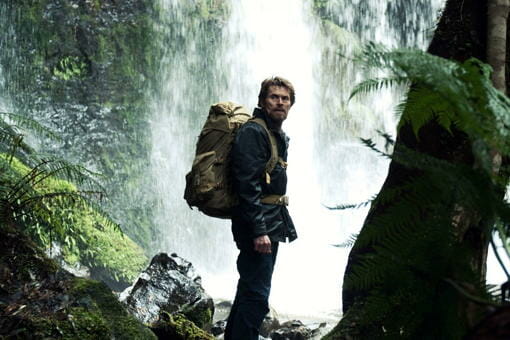By Jim Rohner · April 9, 2012

Forty-eight years after the last Tasmanian tiger died in Hobart Zoo in 1936, the International Union for Conservation of Nature declared the animal extinct. But at the outset of The Hunter, an employer from biotech company, Red Leaf, assures Martin David (Willem Dafoe) that confirmed sightings are known by the right people. Davis, a mercenary whose reputation precedes him, has been hired to seek out the elusive beast because his solitary and unattached nature ensures that he'll be able to handle a hunt for the elusive beast that will see him isolated in the Australian wilderness for days on end. Red Leaf claims it's looking for the tiger for the purposes of cloning, but how much can you trust an employer who is two weeks late to a pre-arranged meeting in a Parisian airport?
Living arrangements for David have been made at the household of Lucy Armstrong (Frances O'Connor), a mourning housewife whose husband disappeared a year ago while also looking for the tiger. Close family friend Jack Mindy (Sam Neill) does what he can to help, but David finds himself the unwilling de facto father figure for rambunctious Sass (Morgana Davies) and her seemingly mute younger brother, Bike (Finn Woodlock). He fixes their generator and they show him the benefits of intimate relationships. After a while, it gets to the point where the family laments his long excursions and celebrates his returns.
But David's presence in Australia isn't uniformly welcomed. The local population, already upset over a court battle that has stalemated their logging industry, isn't too keen on the arrival of an outsider that they assume is there to join the ranks of the local protestors, derogatorily dubbed "greenies." Their hostility towards him transfers osmotically over to the Armstrong family who have taken him in and it's this conflict that commands his focus as his hunt for the tiger proceeds glacially. Clues do arise, but they allude less to a confirmation of the tiger's existence and more to a shady scheme should it actually exist, a scheme that may explain the disappearance of Lucy's husband.
If you've never before seen a film with the theme involving a fish out of water, loner type who finds his heart warmed and priorities changed courtesy of adorable and vulnerable youth types, then welcome to the world of moving pictures – they make 'em in three dimensions now. The Hunter is nothing new and not even anything particularly unconventional considering the Magnolia Pictures name attached to it, but director Daniel Nettheim has put together a solid if not admirably constructed film because of the pieces of the puzzle over which he has control.
Beginning with the casting of Dafoe, the actors draw attention to themselves not through their showiness, but through their ability to relay emotional weight and concede worthwhile connection through a minimal amount of dialogue. At times, the filterless Davies steals scenes with her naivety and at other times (actually, at al times), newcomer Woodlock has to do nothing more than sit there silently to elicit an emotional response. Dafoe adapts to meet either situation, playing the straight man to Davies' childish antics and the proactive leader to Woodlock's silence, skillfully setting up what will be the emotional crux throughout the entirety of the film.
When Dafoe is on his own trekking through the Australian wilderness, Nettheim uses the opportunity to explore the geography expansively. The locales, which range from rushing rivers, to claustrophobic forests, to snowy mountains, are gorgeous and seemingly infinite, casting an awesome dichotomy between the insignificance of one man and the significance of permanently losing a piece of the wild, ecological puzzle. But these moments aren't just reserved for writing love letters to the great outdoors. Often, after lulling us into serenity with camera sweeps and pans, the plot points kick, reminding us that within this great frontier, there are forces working against David.
And yet, it could be argued that the camera spends a little bit too much time lingering amongst the foliage because for a film with a 100-minute running time, The Hunter is surprisingly terse in regards to narrative. While the intimate moments at the Armstrong house don't require a lot of dialogue because of the actors' rapport, the moments in which the local vs. outsider conflict is supposed to be building are woefully insufficient. Outside of the quintessential "we don't want your kind around here" scene in the nearby watering hole, additional scenes meant to generate red herrings or tension just seem like distractions. At one point, a gang of trouble makers drive up to the Armstrong's at night , complain about the protestors holding up their logging, fire a gun into the air and drive off.
The scenario lasts barely a minute and without an innocents being harmed or even directly threatened, it's difficult to feel like there's any reason to be concerned. Of all the scenes that should call attention to themselves, it should be this one, as the conflict between the loggers and the protestors should serve as the outwardly vocal projection of the Man vs. – or rather, abuses – Nature theme that is subtly threaded throughout David's hunt for the Tasmanian tiger. It's not enough to undermine The Hunter's larger message, but it is enough to loosen up what could be a tighter story.